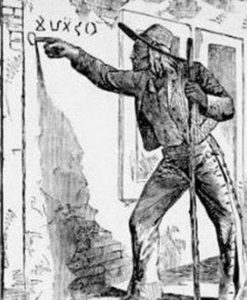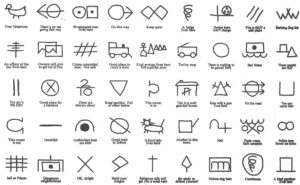

As many of our readers know, Frank (my 100% Irish husband) worked for over 40 years as a professional musician – working from coast-to-coast, and also in the Arizona desert. One of the ditties we’ve heard him sing over the years went something like this: “I’m a rambler, I’m a gambler, I’m a long way from home. If you don’t like me, then leave me alone. I’ll eat when I’m hungry, and I’ll drink when I’m dry. And, if moonshine don’t kill me, I’ll live ‘til I die.”
That reminded me of the article I’ve been writing for this month’s Northwest Connection about hobos.
“King of the Road” is another popular song Frank used to sing. It was written and originally recorded in November 1964 by country singer Roger Miller. The lyrics tell of the day-to-day life of a vagabond hobo who, despite being poor (a “man of means by no means”), revels in his freedom, describing himself humorously or possibly cynically as the “king of the road.”
With the end of the American Civil War in the 1860s, many discharged veterans returning home began hopping freight trains. Others looking for work on the American frontier followed the railways west aboard freight trains in the late 19th century.
A hobo is a migrant worker or homeless vagrant, especially one who is impoverished. The term originated in the Western—probably Northwestern—United States around 1890. Unlike a “tramp,” who works only when forced to, and a “bum,” who does not work at all, a “hobo” is a travelling worker.
Hobos were migratory workers who helped satisfy America’s labor needs starting after the Civil War. They were “homeless” by choice; they worked to travel and traveled to work. Their chief mode of transportation has always been freight trains.
The number of hobos increased greatly during the Great Depression era of the 1930s. With no work and no prospects at home, many decided to travel for free by freight train and try their luck elsewhere.
Life as a hobo was dangerous. In addition to the problems of being itinerant, poor, and far from home and support, plus the hostility of many train crews, they faced the railroads’ security staff, nicknamed “bulls,” who had a reputation of violence against trespassers.
- L. Mencken, in his The American Language (4th ed., 1937), wrote: “Tramps and hobos are commonly lumped together, but see themselves as sharply differentiated. A hobo or ‘bo’ is simply a migrant laborer; he may take some longish holidays, but sooner or later he returns to work.” Lower than the hobo on the societal scale is the bum, who neither works nor travels, except when compelled to move by the police.

The Walking Stick:
For Hobos, the walking stick symbolizes a life’s journey, from cradle to catching the westbound (death). Each twist in the stick represents the unexpected turns that life takes. The scars in the wood are reminders that hurts, hardships, and wounds build strength and character. As many hobos were longshoremen, several decorated their sticks with knots, such as the Turk’s Head. The three strands in the knot represent health, happiness, and long life.
Hobos believe there is a special significance in a walking stick, and they also believe that God carried one. After all, David said, “Lord, Thy rod and Thy staff comfort me.” While hobos use walking sticks for sure footing and protection, they are also used ceremoniously – to officiate at hobo gatherings, coronations of hobo kings and queens, and at funerals. And it is not unusual for a hobo to be buried with his treasured walking stick.
“May your feet stay loose and your fancy free. And if life’s unexpected twists get you down, grab your walking stick and head for the woods.” (Gypsy Moon, Hobo Queen 1990.)
Since 1900 the City of Britt, Iowa has been hosting a National Hobo Convention. The non-profit Hobo Day Association supports the National Hobo Convention by hosting a weekend festival that includes a parade, entertainment, arts and crafts, food and lots of fun. The highlight of this festival is the election of the King and Queen of the Hobos. The hobos come to town and set up a hobo jungle, sell their crafts and provide free entertainment to visitors.

The National Hobo Museum began as the dream of 3 life-long hobos and former Hobo Kings. Determined to preserve the history of the American Hobo, these men formed the Hobo Foundation in the mid-1970s. The foundation, made up of hobos and residents of Britt, Iowa – home of the National Hobo Convention since 1900 – tasked themselves with ensuring that the stories of the American Hobo and Britt Hobo Days would be told for generations to come.
The museum boasts a vast collection of authentic artifacts, memorabilia, paintings, photographs and much more. Additionally, the collection tells the century long story of the National Hobo Convention and showcases personal collections of many of the more notable American hobos including Steam Train Maury, the Pennsylvania Kid, Connecticut Slim, the Hard Rock Kid, Frisco Jack and others.
Museum Hours:
Memorial Day thru Labor Day
Monday – Friday: 10:00 am – 5:00 pm
Saturdays: 9:00 am – Noon
The Hobo Ethical code
An ethical code was created during the 1889 National Hobo Convention in St. Louis, Missouri. This code was voted upon as a concrete set of laws to govern the Nationwide Hobo Body; it reads:
- Decide your own life, don’t let another person run or rule you.
- When in town, always respect the local law and officials, and try to be a gentleman at all times.
- Don’t take advantage of someone who is in a vulnerable situation, locals or other hobos.
- Always try to find work, even if temporary, and always seek out jobs nobody wants. By doing so you not only help a business along, but ensure employment should you return to that town, again.
- When no employment is available, make your own work by using your added talents at crafts.
- Do not allow yourself to become a stupid drunk and set a bad example for locals’ treatment of other hobos.
- When jungling* in town, respect handouts, do not wear them out, another hobo will be coming along who will need them as badly, if not worse than you.
- Always respect nature, do not leave garbage where you are jungling.
- If in a community jungle, always pitch in and help.
- Try to stay clean, and boil up [bathe and wash your clothes] wherever possible.
- When traveling, ride your train respectfully, take no personal chances, cause no problems with the operating crew or host railroad, act like an extra crew member.
- Do not cause problems in a train yard, another hobo will be coming along who will need passage through that yard.
- Do not allow other hobos to molest children, expose all molesters to authorities, they are the worst garbage to infest any society.
- Help all runaway children, and try to induce them to return home.
- Help your fellow hobos whenever and wherever needed, you may need their help someday.
- If present at a hobo court and you have testimony, give it. Whether for or against the accused, your voice counts!
*jungle/jungling = hobo “communities” or shelters
No Comments
Leave a comment Cancel